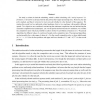183
click to vote
IS
2011
14 years 9 months ago
2011
Abstract. Process mining allows for the automated discovery of process models from event logs. These models provide insights and enable various types of model-based analysis. This ...
104
click to vote
HCI
2009
14 years 11 months ago
2009
The aim of this work was to investigate arm gestures as an alternative input modality for wrist-worn watches. In particular we implemented a gesture recognition system and question...
121
click to vote
JSAC
2010
15 years 14 days ago
2010
—The advent of practical rateless codes enables implementation of highly efficient packet-level forward error correction (FEC) strategies for reliable data broadcasting in loss-...
127
click to vote
JCO
2007
15 years 1 months ago
2007
We study a variant of classical scheduling, which is called scheduling with “end of sequence” information. It is known in advance that the last job has the longest processing ...
100
click to vote
ESA
2008
Springer
15 years 3 months ago
2008
Springer
This paper re-examines the classical problem of minimizing maximum lateness which is defined as follows: given a collection of n jobs with processing times and due dates, in what o...
146
click to vote
LATIN
2010
Springer
15 years 4 months ago
2010
Springer
We study the problem of designing truthful algorithms for scheduling a set of tasks, each one owned by a selfish agent, to a set of parallel (identical or unrelated) machines in or...
140
click to vote
HIPC
2000
Springer
15 years 5 months ago
2000
Springer
Heterogeneous computing environments have become attractive platforms to schedule computationally intensive jobs. We consider the problem of mapping independent tasks onto machines...
129
click to vote
APPROX
2006
Springer
15 years 5 months ago
2006
Springer
Motivated by applications in batch scheduling of jobs in manufacturing systems and distributed computing, we study two related problems. Given is a set of jobs {J1, . . . , Jn}, w...
119
click to vote
COCOON
2007
Springer
15 years 6 months ago
2007
Springer
This paper deals with problems which fall into the domain of selfish scheduling: a protocol is in charge of building a schedule for a set of tasks without directly knowing their l...
110
click to vote
CIA
1998
Springer
15 years 6 months ago
1998
Springer
In a simple cooperative MAS model where a collection of "querying agents" can send queries to a collection of "information agents", we formalize the problem of ...



